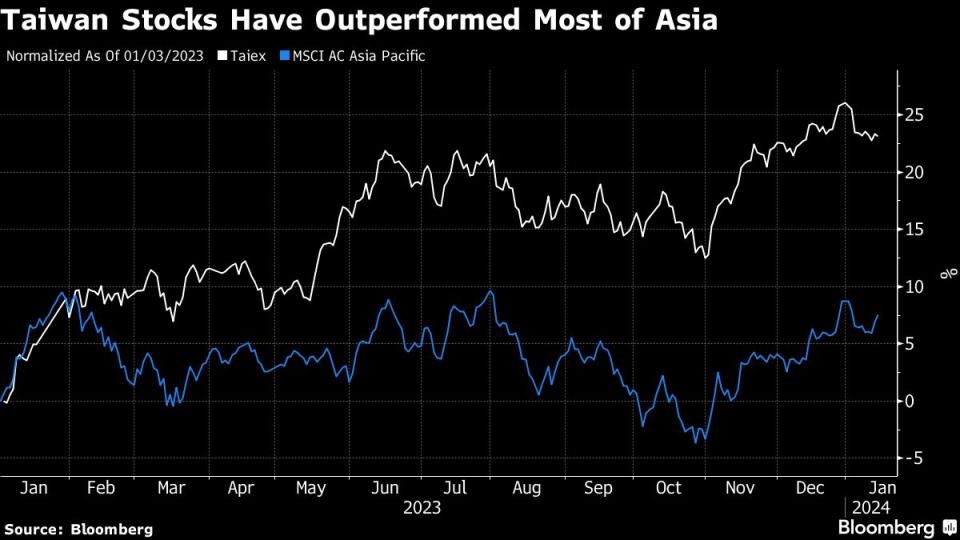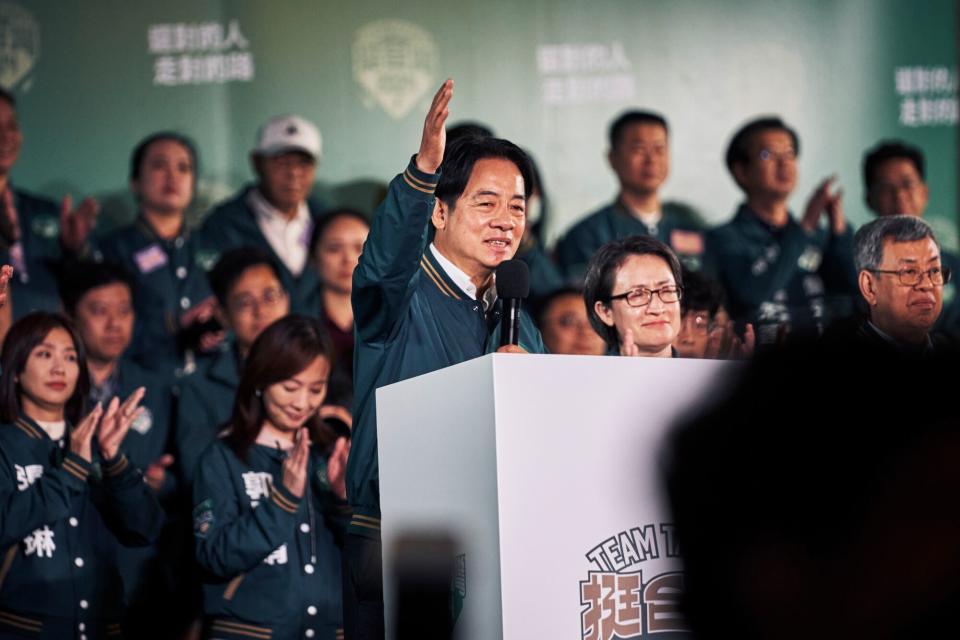Taiwan Election Fails to Cheer Markets as Focus Turns to Policy
(Bloomberg) -- Taiwan’s stocks posted modest gains while its currency weakened as investors digested the weekend’s election results, with the potential for legislative gridlock and continued cross-strait tensions tempering sentiment.
Most Read from Bloomberg
Trump Scores Easy Win in Iowa With DeSantis a Distant Second
Iowa Latest: Biden Calls Trump ‘Clear Frontrunner’ After Win
What Is Disease X? How Scientists Are Preparing for the Next Pandemic
Apple to Pull Blood-Oxygen Tool From Watches to Avoid US Ban If Appeal Fails
The ruling Democratic Progressive Party won the presidency but lost its legislative majority, suggesting it will have to work with other major parties — including the more China-friendly Kuomintang — on policy. The Taiex stock benchmark closed just 0.2% higher, paring a bulk of its earlier gain. The local dollar fell 0.3%, with traders citing foreign outflows.
While a win by Lai Ching-te, whose party is reviled by Beijing for its pro-independence stance, was expected, his tight margin points to hurdles in getting through his domestic agenda. After securing the lowest winning percentage since 2000, Lai pledged to study his rivals’ policies and include people from other parties in official appointments.
The DPP’s loss of its majority in the legislature is likely to weaken Lai’s presidency, giving rival parties leverage in shaping the legislative agenda, said Redmond Wong, chief China strategist at Saxo Markets.
“They will also have significant power to scrutinize the Lai administration’s budgetary bills,” Wong said. “The potential result is a series of heated negotiations and standoffs that may lead to a more centrist orientation of policies in Taiwan over the next four years, potentially having a positive impact on financial markets.”
Lai’s party also lost seats to the Taiwan People’s Party amid growing voter frustrations over domestic issues, such as high property prices and slower-than-expected wage growth.
Lai pledged to “vigorously” help further develop the island’s chip industry, which is dominated by Taiwan Semiconductor Manufacturing Co. The stock rose as much as 1% amid expectations of better ties with the US, which is crucial in ensuring access to chip-making equipment from Western providers.
Markets will watch how China acts going forward. The Chinese government avoided mentioning the winner’s name in its initial responses, with a Taiwan Affairs Office spokesperson saying the election result showed the DPP doesn’t “represent mainstream public opinion on the island.”
In a diplomatic blow, the government of Nauru, a tiny Pacific Island, said Monday it’s cutting official exchanges with Taiwan. China’s Foreign Ministry said it welcomes Nauru’s decision.
“While the uncertainty on who governs Taiwan is over, the uncertainty on cross-straits relations remains a risk,” said Christopher Wong, an FX strategist at OCBC Bank. Aside from geopolitics, the currency will be driven by factors such as export trends, the tech outlook and Fed policy in the US, he said.
Wind power companies rose Monday as Lai’s party favors renewables and wants to phase out nuclear power by 2025. Firms that produce materials for wind turbines including Century Iron & Steel Industrial Co. gained.
A tourism sub-gauge of the Taiex fell 2% to mark the worst sectoral performance, on concerns that the result bodes ill for cross-strait travel.
Here’s what else analysts are saying:
Redmond Wong, Saxo Markets:
The dynamics of the triangular relationship between the U.S., China and Taiwan geopolitically, and in the global semiconductor supply chain, are risk factors that investors should follow closely in the medium term.
Stephen Chiu, Bloomberg Intelligence
Taiwan dollar’s drop after the polls is a technical move and also reflects concerns that the electoral outcome may mean that the new cabinet will find it hard to execute policies,
“Actually both market consensus and positioning have been quite bullish on TWD already before the elections, so a revert lower might be inevitable regardless of the election outcome
Gary Tan, Allspring Intrinsic Emerging Markets Equity:
China may take some consolation in that there is a more balanced representation of parties, and the DPP’s expression of willingness to engage more with China.
Gary Ng, senior economist at Natixis:
The election outcome does not change the global trend of de-risking. Taiwanese firms have no choice but to pursue overseas investment more than ever for friend-shoring integration in non-China markets.
The fact that the US is the biggest client of export orders means Taiwan will continue to decouple from China, though the pace may be affected by a hung parliament.
Its crucial role in chip-making will continue to be the magnet for attracting FDI with advantages in efficiency and innovation. Foreign investment sentiment will likely stay positive.
--With assistance from Iris Ouyang.
Most Read from Bloomberg Businessweek
Trumponomics 2.0: What to Expect If Trump Wins the 2024 Election
Kim Kardashian’s Skims Isn’t the Only Celebrity Brand to Watch
©2024 Bloomberg L.P.



